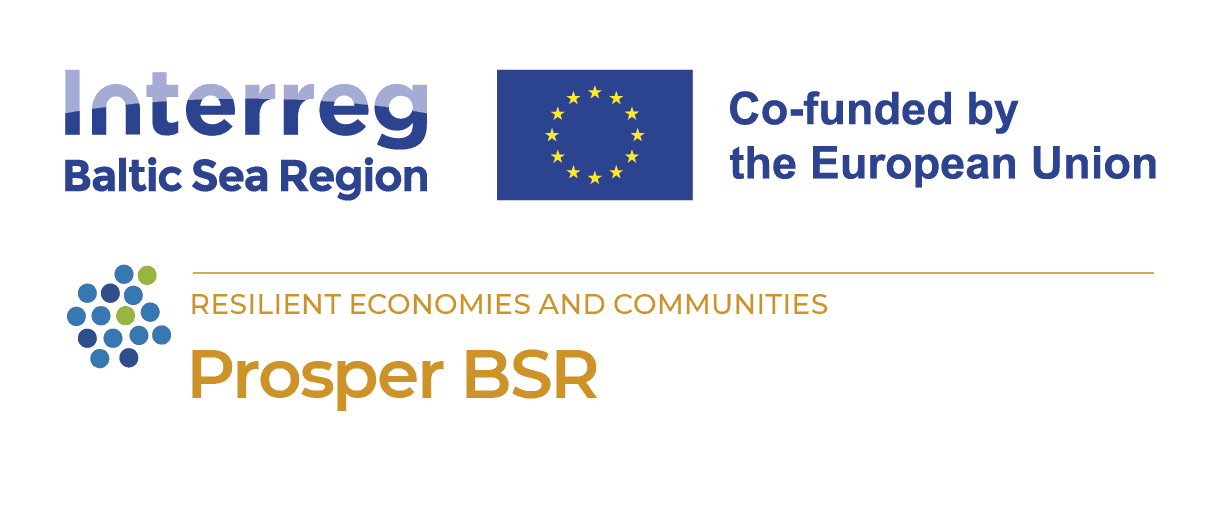
Employers Could Offer More Jobs to Ukrainians, but the Language Barrier Is an Obstacle
05 February 2024

Business owner Sigitas Jurčys does not regret hiring Ukrainian Katya and her compatriots, who are also trying to live up to their employer’s expectations.
Ukrainians have worked in Biržai district recruited through private employment agencies in the past; however, those cases have been isolated. With the outbreak of the war in Ukraine, local entrepreneurs and the Biržai Employment Service have been facing the challenge of war refugees moving to the district.
With around 200 Ukrainians settling in Biržai at any given time, the differences in culture and working conditions have become apparent. Many employers had to refresh their Russian language, as all the Ukrainians who arrived were fluent in the language. They also had to think about accommodation and introducing to the work culture and procedures as well as current laws.
Those Who Want to Work Do Not Complain
Justina Butaitė, HR administrator at SLT Industrial Components, says that the first Ukrainians began working in the company long before the war has started. The company cooperated with a recruitment agency that worked with unemployed people from Ukraine or people looking for work abroad. She observes that it has been difficult to find people willing and able to work in shifts in the district. “We employed four Ukrainian workers through that agency,” Butaitė said. “When the war broke out, the situation had changed. Currently, we have a low turnover of workers. There are even some who were hired for seasonal work, but they came back.”
Now, the SLT Industrial Components has fifteen to sixteen Ukrainians, slightly more women than men, working in the company on a permanent basis. The company also employs a woman from Uzbekistan. “Last year, we employed an Italian and a Polish. The latter already speaks excellent Lithuanian,” Butaitė noted. The HR administrator emphasized that those who want to earn money are given a chance to do that. They do not complain about the pay, or at least the company representatives have not heard any complaints regarding the issue.
Swedes Provided the Housing
When asked about a language barrier or cultural differences, Butaitė said: “There is no problem with the language. We communicate with all Ukrainians in Russian. Some of them attend Lithuanian language classes.” The HR administrator explained that when the war broke out and refugees began flooding into the Biržai area, the Swedish owners of the company bought a house in Biržai, providing accommodation for the Ukrainians. Two families with children currently live in the house. “Even if one member of the family is working, the whole family can live there. They pay only the utility bills,” Butaitė said. The representative of the company added that the company found more than one employee a place to live. Company’s director Liutauras Variakojis also rents a house for one Ukrainian family.
Some Disappointing Cases
Ramūnas Vileišis, the managing director of a company specializing in the construction of steam baths and other wooden houses, has shared a slightly different experience of employing Ukrainians. “We offer a job that is more often chosen by men. Unfortunately, our experience has not been very positive,” Vileišis says. “Men want a good salary, but they are in no hurry to get to work. When I ask them what they can do, they say that they know how to do everything, but when it comes to business, it turns out that they don’t know how to do it. It has been difficult to find common ground with the Ukrainians.”
A Former Emigrant Knows the Cost of Emigration
Sigitas Jurčys, the founder of company Biržų šokoladas, has been satisfied with the work of Ukrainians: “I myself have been an emigrant for many years, so I understand the situation of Ukrainians. I took the initiative to help them settle in Biržai district.” Three Ukrainians currently work in Jurčys’ company. One of them has been working for more than a year and the other two for less than a year. The entrepreneur says that even keeping in mind the difficult labor situation in the area he decided to employ the workers during the winter; even though usually the company reduces the number of employees outside the tourist season because of the tax burden. Jurčys said that with the addition of Ukrainian employees, he could finally realize a long-cherished idea of serving Ukrainian dishes to the café’s visitors. The traditional Ukrainian dumplings, known as vareniki, is the most popular dish there.
The Owner is a Colleague First
Jurčys shared his thoughts about adaptation challenges and cultural difficulties the Ukrainian employees face: “You can really feel the cultural difference. They live in Ukraine as we did twenty or even thirty years ago.” One woman worked in a state-owned company and the other in the private sector in an administrative job; therefore, both of them had to go through a difficult process of adaptation. The women were employed right at the height of the tourist season, so they were really scared of the workload. But the director of the company reassured them, “Wait for autumn, you’ll see that things will calm down.”
The Ukrainians were astounded to see the owners of the café in the kitchen along with their employees, sometimes even to watch them peeling potatoes or washing dishes. “At first they didn’t even conceive it could be like that, they worried about not being able to finish chores on time. So I had to calm them down, tell them that everything was fine,” Jurčys said. He reassured his employees that they could tell him that they didn’t have time to do certain tasks, because that was only natural in the tourist season. “We, locals, are used to this kind of thing: the manager is a colleague first and then the boss. It’s natural,” the director of the company noted. “We found it strange that they found it difficult to understand.”
Different Work Culture
The entrepreneur observed that it was not difficult to employ Ukrainians, all they had to have was proper documents. “Everything’s fine, the only drawback is that as third-country nationals they are subject to higher taxes,” Jurčys regretted. “Of course, at the end of the year they can declare their income and get some money back, but a person needs money today, they do not want to wait for the end of the year.” The director of the company says that the language barrier is not a problem, because everyone speaks Russian. Ukrainian women have already learned the names of Lithuanian dishes.
The work culture was a problem at first. “Since we pay an hourly wage, it was difficult for the Ukrainian workers to understand that they could not not go to work at their own expense,” Juršys said. “I explained to them that even the labor code doesn’t provide that, and most importantly, that every time they decide not to come to work, someone else will have to do both their own job and that of their absent colleague. And that would not be nice to colleagues.” Today, such problems no longer exist in the company. If necessary, the employees take turns: they cover for each other and write down the hours they worked.
More Than Twenty Ukrainians Are Looking for Work
Eugenija Grabauskienė, head of the Biržai Employment Service, said that twenty Ukrainian citizens are currently registered as unemployed at the Biržai branch of the Employment Service. Another four persons have other statuses, such as temporary employment participants or persons preparing for the labor market. As of March 2022, 107 people who left the country because of the war in Ukraine have applied to the Biržai office (thirty of them have registered more than once with the Employment Service). No foreigners from other countries are currently registered in the office.
The Need to Learn the Language
When asked about the specific jobs that the Employment Service could offer to foreigners, Grabauskienė replied: “We offer the same jobs to Ukrainian citizens as we do to Lithuanians. When registering vacancies, employers have the possibility to indicate that they can also employ Ukrainians. When registering with the Employment Service, war refugees usually indicate that they are looking for unskilled work. The main reason for this is that they do not speak Lithuanian. Most of the Ukrainians start working as unskilled workers on the assembly line, also as auxiliary workers and manual laborers.”
No Unsatisfactory Feedback on the Ukrainians Employed
The head of the Biržai branch of the Employment Service says that most Ukrainians are not able to get a job because of personal circumstances, for example, mothers with small children have no opportunities to work in shifts. Sometimes the salary is the reason why people are not able to get a job quickly—they are looking for better paid jobs. When asked about the feedback on the Ukrainians the agency employs, Grabauskienė notes that they have not received any specific feedback about Ukrainian war refugees in employment. She acknowledges that there are some cultural and work culture differences, but if a person wants to work, they adapt. “We have examples of Ukrainians who were hired in the spring of 2022 and are still working successfully,” Grabauskienė said.
Solving Lithuania’s Demographic Problem
Deimantė Vilčinskaitė, project manager of Vilnius Chamber of Commerce, Industry and Crafts, said that the Chamber is participating in the Interreg Baltic Sea Region project PROSPER BSR from 2022. The idea of this project was born when a need arose to help refugees from Ukraine with a profession and at the same time to address the shortage of skilled workers in many European Union countries. “The current wave of millions of refugees from Ukraine poses major challenges, especially for the Baltic Sea countries,” Vilčinskaitė observed. “However, it should not be seen as a problem but above all as an opportunity.” According to the representative of the Chamber, due to demographic changes, all the Baltic Sea countries are facing a severe shortage of skilled workers in almost all sectors. Successful integration of refugees into the labor market will ease the burden on the social system and bring back dignity and perspective to people.

“It is very important to share both good and unsatisfactory experiences when employing Ukrainians,” Deimantė Vilčinskaitė, project manager of Vilnius Chamber of Commerce, Industry and Crafts, says.

The article was first published in the newspaper Biržiečių žodis, January 9, 2024, Darbdaviai ukrainiečiams galėtų pasiūlyti ir daugiau darbų, bet trukdo kalbos barjeras | Biržiečių žodis (birzietis.lt)





